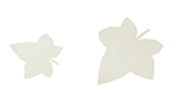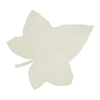|
Catnip - Nepeta cataria
One
of the best-loved by felines, this aromatic perennial
herb grows to about 3 ft and has heart-shaped grey-green
leaves (similar to the mint) and whorls of white
flowers with purple spots.
Catnip
has a pleasant taste, and makes an ideal substitute
for the daily cuppa - it was a favourite country
tea long before the black tea we all know so well
arrived from the Far East. The leaves of Catnip
[and the leaves of many mint relatives] are rich
in vitamins C and E, and contains flavonoids and
trace elements of magnesium and manganese.These
antioxidants and trace minerals have been shown
to help slow the development of cataracts, and a
daily cup or two of catnip tea should significantly
reduce the likelihood of developing cataracts.
Catnip is also a mild tranquiliser - try a cup of
Catnip tea before bedtime for a sound sleep [or
try blending Catnip with another relaxing herb such
as Lemon Balm or Chamomile].
A
gentle herb, Catnip makes a suitable drink for children
and will help soothe feverish chills. Catnip makes
useful tea for soothing nervous headaces and is
a good digestive aide, nerve relaxant, cold preventative,
and hiccup remedy. The root used to be ground with
cloves and used as a remedy for toothache, and a
catnip infusion rubbed gently into the gums can
help with teething. Used externally catnip ointments
and poultices are good for treating brusies and
minor wounds.
A smoking mixture of catnip was used to treat bronchitis
- however, it is reportedly a mild hallucinagenic
when smoked.
As
Gerard describes in his Herball (1633) “Cats
are very much delighted herewith for the smell of
it is so pleasant to them that they rub themselves
upon it and wallow and tumble in it, and also feed
upon the branches and leaves very greedily...”
A Victorian custom was to reward mice-catching-cats
with catnip toys shaped like mice - now one of the
best known (and loved) cat toys! |











